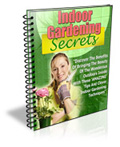Welcome to Gardening Guide
2 Organic Gardening Article

Organic Gardening
from:Organic gardening is generally considered to be any method of gardening that does not utilize any chemicals or pesticides to maintain the garden. One can practice organic gardening in a vegetable or flower garden – or in any other area in which someone is trying to grow things.
There are many reasons that people want to practice organic gardening. Many people like the idea of wholesome, fresh vegetables that don’t have any form of chemical, possibly poisonous residue on them. Many people like to have plants which will attract a variety of small wildlife, such as butterflies and bees. Many people have small children or pets and don’t want to take the chance that the chemicals frequently used in non-organic gardening could hurt their children or pets.
Organic gardening is not “simple gardening”. Effort is needed to have successful gardens in most situations and this is no exception. One needs to plan the garden before starting it. It is necessary to consider what kind of garden one wants, where it will be kept, how it will be organized and if companion plants are to be included.
Organic gardening needs compost. Compost is a mixture of topsoil and a variety of organic matter such as leaves, vegetable refuse, manure air and water. This mixture needs to be turned or mixed frequently, so there needs to be room to work with the developing compost. Once the compost is ready, it is used as the basic medium into which the plants or seeds are placed. Generally, the compost is created before the garden is planted.
The location of the garden is important. Does the area get a lot of sun? Will it be high enough so that it won’t be frequently flooded in major rain storms? Will it need any protection if the weather suddenly turns too chilly? Is there easy access to the garden? The location of the plants in the garden must also be considered.
Companion plants are plants that have some kind of natural chemical that repels a variety of insects or diseases. Garlic, for example, planted near roses tends to repel the aphids that frequently attack roses. Oregano is thought to repel the cucumber beetle. Some plants can help repel nematodes. If planned well, it is possible for a gardener to be able to have a flower garden in the exact same spot as a vegetable garden. The geographic location of the garden – is it in Alaska, Nevada, Florida or elsewhere? – will need to be considered when deciding what to plant in an organic garden.



